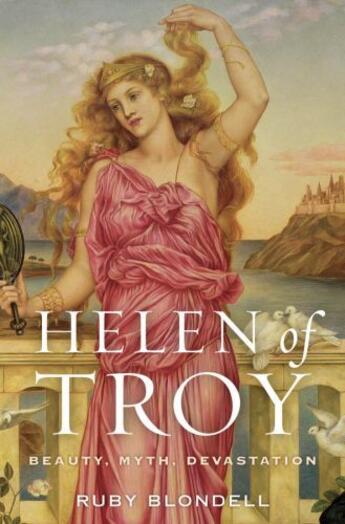Des idées de lecture pour ce début d'année !
Passionné(e) de lecture ? Inscrivez-vous
gratuitement ou connectez-vous pour rejoindre la
communauté et bénéficier de toutes les fonctionnalités du site !

The story of Helen of Troy has its origins in ancient Greek epic and didactic poetry, more than 2500 years ago, but it remains one of the world's most galvanizing myths about the destructive power of beauty. Much like the ancient Greeks, our own relationship to female beauty is deeply ambivalent, fraught with both desire and danger. We worship and fear it, advertise it everywhere yet try desperately to control and contain it. No other myth evocatively captures this ambivalence better than that of Helen, daughter of Zeus and Leda, and wife of the Spartan leader Menelaus. Her elopement with (or abduction by) the Trojan prince Paris "launched a thousand ships" and started the most famous war in antiquity. For ancient Greek poets and philosophers, the Helen myth provided a means to explore the paradoxical nature of female beauty, which is at once an awe-inspiring, supremely desirable gift from the gods, essential to the perpetuation of a man's name through reproduction, yet also grants women terrifying power over men, posing a threat inseparable from its allure. Many ancients simply vilified Helen for her role in the Trojan War but there is much more to her story than that: the kidnapping of Helen by the Athenian hero Theseus, her sibling-like relationship with Achilles, the religious cult in which she was worshipped by maidens and newlyweds, and the variant tradition which claims she never went to Troy at all but was whisked away to Egypt and replaced with a phantom. In this book, author Ruby Blondell offers a fresh look at the paradoxes and ambiguities that Helen embodies. Moving from Homer and Hesiod to Sappho, Aeschylus, Euripides, and others, Helen of Troy shows how this powerful myth was continuously reshaped and revisited by the Greeks. By focusing on this key figure from ancient Greece, the book both extends our understanding of that culture and provides a fascinating perspective on our own.
Il n'y a pas encore de discussion sur ce livre
Soyez le premier à en lancer une !

Des idées de lecture pour ce début d'année !

Si certaines sont impressionnantes et effrayantes, d'autres sont drôles et rassurantes !

A gagner : la BD jeunesse adaptée du classique de Mary Shelley !

Caraïbes, 1492. "Ce sont ceux qui ont posé le pied sur ces terres qui ont amené la barbarie, la torture, la cruauté, la destruction des lieux, la mort..."